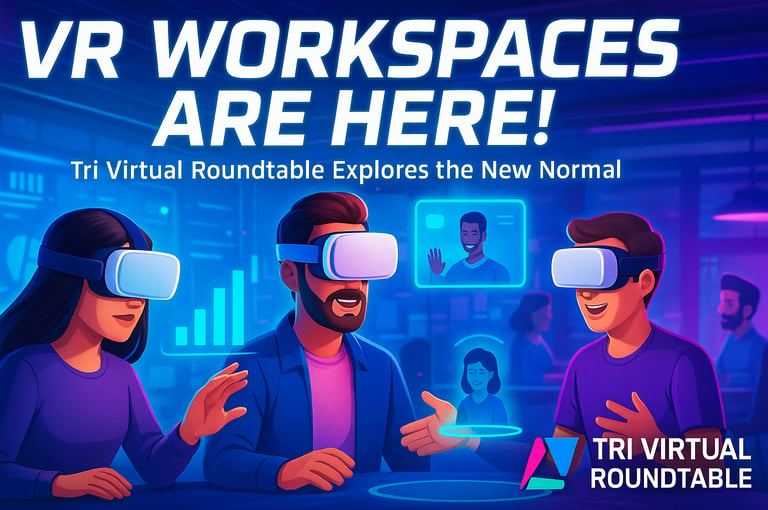The Future of Work: Remote Collaboration in Virtual Spaces
The way we work has been evolving rapidly, but few developments are as revolutionary—or as promising—as the rise of virtual reality (VR) in the professional world. What once sounded like science fiction is now a functional, productive environment where colleagues can meet, create, sell, and even build entire businesses—without ever stepping into a traditional office.
By Tri Virtual Roundtable
5/9/20253 min read


From Conference Rooms to Virtual Boardrooms
With the rise of VR platforms such as Multiverse on Meta Quest and Horizon Worlds, professionals now have the ability to gather in immersive, three-dimensional environments that go far beyond traditional Zoom calls or Slack chats. These platforms allow users to:
Hold team meetings in fully customizable virtual spaces
Share and interact with digital whiteboards, 3D models, and live presentations
Network at virtual trade shows or career expos
Use avatars to express emotions and gestures, enhancing team dynamics
Instead of being boxed into a grid of video thumbnails, users can walk around a virtual office, step into breakout rooms, and collaborate on documents as if they were side-by-side.
Breaking Distance Barriers
One of the most powerful features of VR workspaces is the ability to collaborate across great distances. Whether your team is spread across states, countries, or continents, VR platforms offer a "shared presence"—a feeling of actually being together in the same space.
Multiverse on Meta Quest excels at spatial design, letting users co-create storefronts, events, and branded spaces tailored to their business.
Horizon Worlds supports real-time interaction and community building, making it ideal for project collaboration, idea pitching, and even hosting launch events.
These environments enable instantaneous interaction, without the travel costs or time zone delays that normally complicate global teamwork.
Commerce in the Virtual World
It’s not just about meetings—commerce is booming in VR. Platforms like Multiverse and Horizon Worlds allow users to create, showcase, and sell virtual goods and services:
Digital storefronts can sell clothing, furniture, art, and even real-world items via embedded links.
Developers and entrepreneurs are monetizing experiences, such as guided tours, concerts, consulting sessions, and workshops.
Freelancers are offering services like interior design, business coaching, and branding consultations—all within VR spaces.
These transactions often involve digital currencies or are linked directly to platforms like PayPal, making commerce seamless and convenient.
Real-World VR Collaborations: Friendships and Businesses Born in the Multiverse
A powerful example of remote collaboration in VR is the Tri Virtual Roundtable podcast itself. The show is hosted by three individuals—Devland Lister, Michael Stann, and Maasi Smith—who first met inside the Multiverse platform on the Meta Quest VR headset. What began as casual conversations grew into deep friendship and eventually sparked the creation of a podcast that blends real-world topics with virtual reality experiences.
But it didn’t stop there.
Devland Lister and Michael Stann later partnered in a company called Media4U, originally founded by Devland. The business specializes in website creation and digital services, merging traditional websites with virtual storefronts and experiences inside the metaverse. Clients can enhance their brand visibility both online and in immersive VR spaces.
Meanwhile, Devland Lister and Maasi Smith began a collaboration within a platform called GoToVair, a growing VR environment where creators can host virtual events, design interactive spaces, and provide immersive educational or business experiences. GoToVair stands out for its flexibility and community-building focus, making it ideal for entrepreneurs and developers seeking new ways to engage their audiences.
These real-life examples show that VR isn't just a place to play—it’s a space where meaningful relationships and viable businesses are born.
Conclusion
Virtual reality isn't just a cool new gadget—it’s a transformative tool that’s changing how we think about work, business, and connection. Whether you're leading a remote team, building a brand, or starting a storefront, platforms like Multiverse and Horizon Worlds are proving that the office of the future isn’t in a building—it’s in the headset.
As technology improves and more companies embrace VR, the possibilities for collaboration, creativity, and commerce in these digital spaces will only grow.
